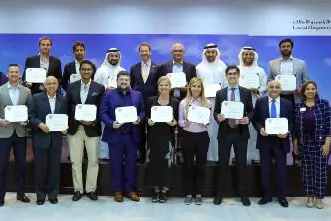PHOTO
Dubai: Dubai Land Department (DLD), through its educational arm, Dubai Real Estate Institute (DREI), recently hosted a training programme titled ‘Investment Strategies in Real Estate’ by the Harvard Graduate School of Design (GSD) Executive Education department. During the 16-hour programme held on 15 – 16 April by the lecturer Fernando Levy Hara, participants were introduced to strategies that lead to successful investments in the real estate sector.
HE Sultan Butti bin Mejren, Director General of DLD, said: “The premise of the programme is based on the changes occurring in the real estate sector in light of globalisation challenges, changes in the real estate development sector, and fierce competition among international markets. These factors require developers, architects, and urban designers and planners to resort to practical solutions like the expanding of their scope of work to include international dimensions. To achieve the desired success, those concerned have to build strong international business strategies based on different factors, helping them efficiently manage their projects from start to finish through all development, implementation, and promotional stages.”
The programme included an analysis of the real estate development process from the perspective of different project stakeholders, including developers, equity investors, and lenders among others. It also allowed participants to go over every phase of the project using the ‘Eight Phases Model,’ covering the inception of the idea, the financial feasibility analysis, the creation of the most efficient legal structure, the determination of the optimal capital structure, the building phase, project management, and commercialisation.
The programme addressed issues relating to the importance of assessing the full potential of a project, with an urgency to identify external factors, research the economic cycle the market is going through, and how to address all these elements from a risk and opportunity perspective. It also allowed participants to explore how to take advantage of both expansions and recessions, how to prepare projects for the next cycle, and how to anticipate and outmanoeuvre competitors.
The two-day programme covered different business cases of international projects. By looking at international examples and current best practices, participants learned how to assess, measure, and mitigate the risks they would face in particular countries and markets. Participants also learned how to adapt the design of projects to different cultural environments as well as how to ‘export’ good design practices from one place to another around the world.
Hend Obaid Al Marri, CEO of DREI, commented: “Real estate developers, architects, designers, and urban planners need to understand all these ‘elements’ to design and implement the best investment strategies for a particular market. However, projects may still achieve success if the developer possesses adequate negotiation abilities, which was the focus of the second part of the programme.”
At the end of the programme, participants were awarded a certificate of completion from Harvard University. The programme was designed to assist participants in developing guiding principles for the development of real estate strategies and understanding how to create and contribute to a successful real estate investment strategic plan in international markets. The nine interactive sessions included studies of several business cases and featured international examples and discussions of best current practices.
-Ends-
© Press Release 2019Disclaimer: The contents of this press release was provided from an external third party provider. This website is not responsible for, and does not control, such external content. This content is provided on an “as is” and “as available” basis and has not been edited in any way. Neither this website nor our affiliates guarantee the accuracy of or endorse the views or opinions expressed in this press release.
The press release is provided for informational purposes only. The content does not provide tax, legal or investment advice or opinion regarding the suitability, value or profitability of any particular security, portfolio or investment strategy. Neither this website nor our affiliates shall be liable for any errors or inaccuracies in the content, or for any actions taken by you in reliance thereon. You expressly agree that your use of the information within this article is at your sole risk.
To the fullest extent permitted by applicable law, this website, its parent company, its subsidiaries, its affiliates and the respective shareholders, directors, officers, employees, agents, advertisers, content providers and licensors will not be liable (jointly or severally) to you for any direct, indirect, consequential, special, incidental, punitive or exemplary damages, including without limitation, lost profits, lost savings and lost revenues, whether in negligence, tort, contract or any other theory of liability, even if the parties have been advised of the possibility or could have foreseen any such damages.




















